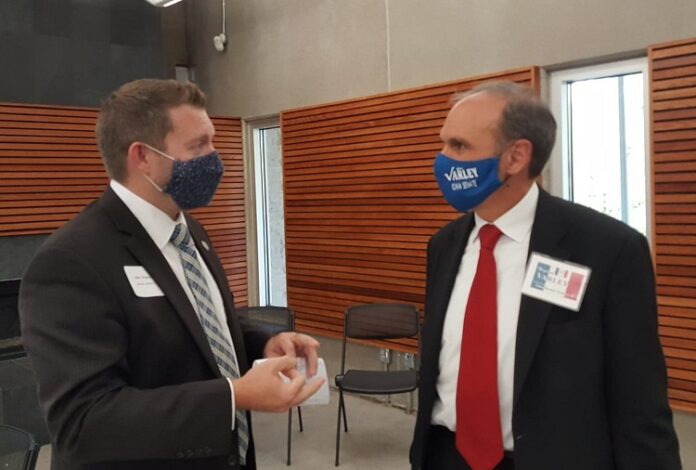
The race for Iowa Senate District 10, which includes Perry, pits two-term incumbent Jake Chapman, the Adel Republican, against Stuart farmer and lawyer Warren Varley, whose father was the Republican Speaker of the Iowa House of Representatives in the days of Gov. Robert D. Ray.
Chapman’s campaign rhetoric has closely imitated that of President Donald J. Trump, with a strong emphasis on the “rule of law” against the “total chaos” of looters and rioters and the menace of “socialistic solutions,” as Chapman said in a recent fundraising flyer.
Where Chapman raises fearful alarms in the style of Trump, Varley seems calm, measured and moderate in his rhetoric. Where Chapman stirs his base — and raises funds — with guns and abortions and a siege mentality, Varley focuses on more everyday, state-level issues, like increasing funding for public schools and mental health services or preventing domestic violence or developing rural economies with affordable, high-speed internet.
“My dad had me cultivating corn and beans from the time my legs were long enough to reach the tractor pedals,” Varley said, “and when I was learning to drive, he told me to ‘keep it between the ditches,’ and that’s not a bad description of my political philosophy.
People of this district tell me they are tired of the extremism and division that have poisoned our political conversations.”
The striking difference in their views is illustrated in their legislative priorities. Asked at an Oct. 23 forum in Urbandale what his number one policy proposal for the next legislative session will be, Chapman said he would work to “restore and ensure the rule of law” in the face of “total chaos.” He referred again in an Oct. 25 speech to the “total anarchy” that is threatening the “rule of law,” and he promised to “never, ever defund the police.”
Chapman began back in June to denounce the “full anarchy” of the Black Lives Matter movement, when protests around the U.S. following the May 25 murder of George Floyd were frequent, and the Adel lawmaker said he was “literally watching the disintegration of our Nation before our eyes.” By October, the cause of “the lawlessness that is going on in and around our country” had disappeared, leaving only the effect: fear.
Chapman drew brief national attention in early 2017 when he introduced an anti-protester bill to increase the penalty for blocking a high-speed highway from a misdemeanor to a felony punishable by up to five years in prison and a $7,500 fine. His intervention came after an anti-Donald Trump protest by Iowa City high school students in November 2016 blocked one direction of U.S. Interstate 80 for half-an-hour.
As the chief operating officer at his father’s private ambulance company, Chapman understands and appreciates the life-and-death importance of open roadways, and he would probably call for similarly stiff penalties against the Trump supporters currently blocking traffic on major roadways in New York and New Jersey.
Chapman showed his concern for public-safety vehicles again this June when he called for the Iowa National Guard to be deployed in reaction to the spray painting of a Des Moines Police Department patrol vehicle by BLM protesters. Like Trump, Chapman has sung a continuous law-and-order refrain ever since. Saving Iowa’s suburbs is his top legislative priority.
Varley has eschewed all Chicken Little rhetoric. He answered the same top-policy-proposal question at last week’s Urbandale forum with an issue perhaps more tangible and nearer to home for District 10 voters.
“I think education has to be the number one priority,” Varley said. “It’s the most important thing the state does and what we spend the most money on. For 10 out of the last 11 years, we’ve not kept up with the rate of inflation for public education, and that’s put a terrible strain on our schools.”
While Chapman swears he will “never, ever defund the police,” he has proven very willing to defund public education. His attitude toward school funding appears to be formed in part by his libertarian-style opposition to taxation as such and in part by his tutelage under former Iowa state Rep. Ralph Watts, who believed public schools were liberal indoctrination camps.
Chapman shares U.S. Education Secretary Betsy DeVos’ devotion to school choice, which explains why he has called for effectively abolishing public school funding in Iowa.
“The time has come to empower parents to make the choice best for their children,” Chapman said in July, when Iowa school districts were scrambling to formulate Return to Learn plans in the face of the COVID-19 pandemic. “State-appropriated dollars need to go to the parents and allow them to choose where they want to send their children — whether it be public, private, charter, online or homeschool. This would result in nearly $7k per student going to the parents, allowing them to choose where and how they will educate their children.”
Varley said Chapman’s “offensive” proposal for reorganizing school funding would “undermine our public education” by ignoring students with special needs, second-language needs and talented-and-gifted needs, all of whom cost more to educate than the average student. Varley does not want to defund public schools but to defend them.
“We have to start by giving our schools adequate resources,” he said. “They can only cut to the bone so much. The Revenue Estimating Council just came out last week and estimated revenues of 4.1%. I think that should be the baseline for what we increase education. Instead, my opponent sponsored a bill that increased funding for the school tuition program for private schools, which shifts money from state taxpayers to private schools, increased that by 54% over a two-year time period at the same time that we had increases in public education of 2.3% and 2.06%.”
Answering Chapman’s extreme proposal, Varley said that “public funds should be spent on public schools. Vouchers and tax credits to wealthy families undermine public schools and shift wealth to the already wealthy.”
The contrast between the candidates is similarly striking in their attitude toward local control versus top-down, one-size-fits-all state control.
“I support local control,” Chapman said, and he claims to oppose “the government coming in and intruding on your individual rights,” but his libertarianism did not extend to cities or counties wanting to establish gun-free zones in public buildings or require anti-virus face coverings.
In the COVID-abbreviated June session of the Iowa Legislature, Chapman not only joined his fellow Republicans in making it easier for businesses to avoid liability for sick employees but he helped them to take the authority to craft pandemic responses out of the hands of local school officials and to hand it to the governor.
Adding insult to injury, Chapman also mocked the so-called mask-shaming Democrats by sporting a neck gaiter of his own that read, “The 2nd Amendment is My PPE.”
Chapman does not support a statewide mask mandate, and he opposes extending the authority to local governments to issue them.
“This is about personal responsibility,” Chapman said. “If you’re not comfortable going to a restaurant, don’t go to a restaurant, but don’t tell the rest of Iowans that we’re going to impugn your right to be able to go enjoy a meal at a restaurant.”
The risk lies in “government overreach,” Chapman said. “That’s what people are fearful of.” He believes that “Iowans can decide for themselves” when it comes to face masks. “I think Iowans are responsible,” he said, “and I think Iowans are taking steps to mitigate COVID-19.”
With Iowa now surging to fifth nationwide in the rate of community spread of SARS-CoV-2, the virus that causes COVID-19, and with hospitalizations straining resources, Iowans’ prized liberty to broadcast their aerosols in public without the impediment of a face mask begins to sound extreme. Varley’s view keeps between the ditches and emphasizes local control.
“I don’t think we need a state mandate,” Varley said. “I think if we’d had some leadership, we would be in a lot better place than we are now. We need leadership, and those decisions should be made at the local level.” His opponent, he said, “still does not appear to grasp that the point of wearing a mask is to protect others, not necessarily oneself.” Varley said that “at this point, we know from the experience of other states and other countries around the world that the more aggressively we take on the threat posed by the spread of this virus, the more successful we are in keeping the economy open and not having to be in a situation that we’re in right now which, quite frankly, is a little frightening. We’re coming into winter with only 35% of our hospital beds still free, and when I talk to hospital workers and nursing home workers, they’re exhausted. I think we wouldn’t have needed a mask mandate if we’d had more leadership early on. . . . but our leaders don’t set a good example or worse — as in my opponent’s case, he publicly mocked people for wearing masks or suggesting that wearing a mask were a good idea. It’s just unfortunate that a public health issue, where we should all be able to look at the science and say, ‘This is what’s going to work. This is what we should be doing to minimize the threat of this disease,’ but instead it’s been turned into a political issue so that if you’re wearing a mask, then you’re a Democrat, and if you force somebody to wear a mask, then you’re impinging on their personal liberty. . . . This is an example of where the current administration is a little headstrong with the amount of power that they have, and they’ve taken away local control. You know, we could have had a situation where cities and counties were allowed to implement mask mandates in places where we had hotspots . . . but from the very beginning, our governor and other members of her party have really discouraged people from doing things on the local level. That’s not the kind of Democrat I am. I think the closer we can make decisions to where we are, the more opportunities we have to experiment and find out what works and then, once we find out what works, let’s not be political about it. Let’s say, ‘Let’s do this and get Iowa’s economy back on the road to prosperity.'”
Iowa Gov. Kim Reynolds never issued an order for mandatory face coverings, even though the White House Coronavirus Task Force’s Aug. 9 directions said, “Mandate cloth face coverings outside of the home,” repeating again Aug. 23 that “a mask mandate needs to be implemented statewide.” The task force again said Aug. 30, “Mask mandates across the state must be in place to decrease transmission,” and the directions were repeated Sept. 13, “Establish a statewide mask mandate,” and Sept. 27, “Institute mask requirements statewide.” Reynolds steadily disregarded the federal guidance.
If Chapman has not made District 10 voters safer with his view of face masks, then he claims to have made us safer by allowing unlimited guns into public buildings. He was a vocal supporter of House File 2502, signed into law June 25 by Reynolds, which struck down gun-free zones in cities and counties and said firearms could be prohibited in public buildings only if the facility had metal detectors and armed guards.
“What’s happening,” Chapman explained in Urbandale, “is we have local municipalities who wanted to restrict your right to carry a firearm in a public building which, by the way, as taxpayers we own those buildings.” If a city or county wants “to restrict those rights under this bill, you have to provide security. You’ve got to provide the ability to protect me if you’re going to take away my right to protect myself. That’s a reasonable approach,” he said.
Allowing armed citizens unlimited access to city halls and county offices, libraries and community centers, parks and senior centers makes District 10 residents safer, Chapman argues. Varley sees the issue differently, and he criticized the bill as “an unfunded mandate on local governments” when it was first proposed.
“Jake called me a ‘gun grabber,’ which I am not,” Varey said. “I don’t want to take away anybody’s guns, but I think we can all agree there’s certain individuals that probably shouldn’t have a gun, and likewise there’s certain places that we probably shouldn’t have guns. I don’t think it’s unreasonable for a municipality to say, ‘We don’t want to have guns in the local library, but we don’t want to have to have a metal detector installed and then hire a security guard to sit there and monitor people coming in and out.’ This plays very well to a lot of my opponent’s supporters. I know he raises a lot of money this way. He’s got a lot of funds from the Three Percent movement and the Dorr brothers. Quite frankly, this is what I consider taking the state into the ditch. It’s this kind of extremism that the state government should not be wasting its time on. We need to focus on things that will make lives better for the people of this state, and let local issues be determined by local people. What works in Anita is not going to be the same as what works in Urbandale, so we need to give our local governments the opportunity to experiment and do what’s best for them.”
Lobbyists opposing House File 2502 included the Iowa Police Chief Association, Iowa State Sheriffs’ and Deputies’ Association, Iowa Mental Health Planning Council, Iowa League of Cities, Iowa Association of Counties, Iowa Association of County Supervisors, County Zoning Officials Organization, Iowa County Attorneys Association and the Iowa Academy of Trial Lawyers, along with the cities of Des Moines, Iowa City, Cedar Rapids, Cedar Falls, Coralville and Waukee and such civic and religious groups as Iowans for Gun Safety, Brady United Against Gun Violence, Everytown for Gun Safety Action Fund, Iowa Coalition Against Domestic Violence, Episcopal Diocese of Des Moines, Iowa Conference of United Methodist Church and the Interfaith Alliance of Iowa Action Fund.
Lobbyists supporting the bill were fewer but included the National Rifle Association of America, National Shooting Sports Foundation Inc., Iowa Firearms Coalition Inc. and the Iowa Minuteman Civil Defense Corps.
Although Chapman promised to “never, ever defund law enforcement,” his support for House File 2502 was unwelcome to the state’s police chief and sheriffs, and his claim that Varley wants to “defund the police” is “absolutely untrue and quite frankly insulting to me,” Varley said.
“If anybody is defunding the police, it has been the prior Republican administration,” he said. “They’ve done things like close our state mental health hospitals, which has put a tremendous strain on especially our rural sheriff’s departments that have had to pick up the slack. They have had to stay with people in emergency rooms and hospitals because we don’t have beds for them. So we really need to address the mental health care needs in this state, and that would go a long way toward helping our police.”





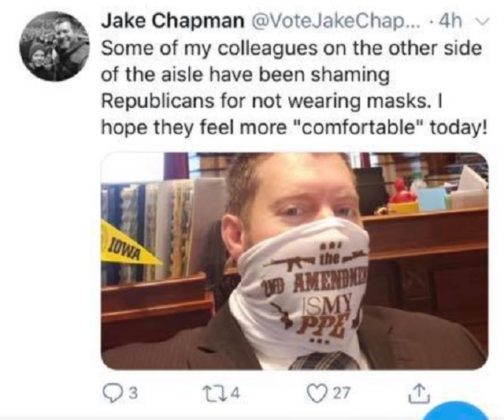
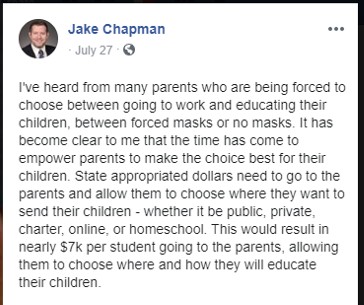





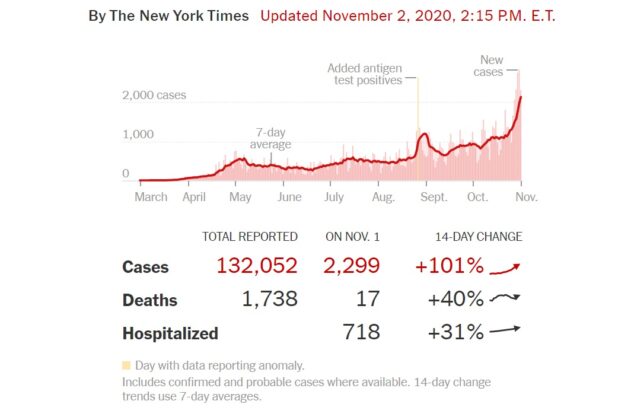
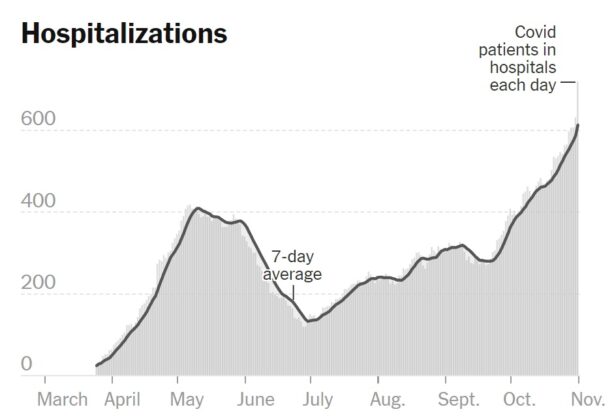
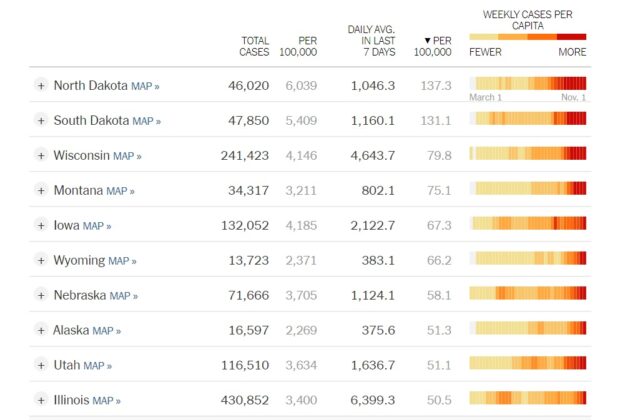








A big, long opinion piece masquerading as a news analysis the day before an election is really not good journalism. But I’m sure you knew that, Jim, but you somehow believe “this year” is just too important for normal journalistic standards.
There is no “masquerading” about it. The story was placed in the opinion section of ThePerryNews.com for a reason. But I’m sure you knew that, Chris, as you set up as a judge of “journalistic standards,” and you wish merely to imply that journalists, of all God’s creatures, are prohibited from having and expressing opinions and if once they do, then they disqualify themselves and prove themselves incapable of normal objectivity and “good journalism” when reporting the news. But why appeal to a common error when you can simply squeal, “Fake news!” which is now the fash-fash-fashion.
Come on, Jim, you know the difference on how news analysis pieces are written and how to write opinion pieces. You dressed up your personal dislike of Chapman as political analysis. But then your issues with him have been apparent whenever his name is mentioned, isn’t it?
Permit me to address your errors. I personally like Jake Chapman, so you are wrong to impute to me any dislike of him. Some of my political opinions might differ from his, but that is apart from my affection for him as a fine young man. And I am sorry if my remark about “Fake news!” confused you, which it appears to have done. I asked, “But why appeal to a common error when you can simply squeal, ‘Fake news!’” This question does not ask why you used the phrase but rather asks why you didn’t. Beyond that, you repeatedly make a distinction between what you call “opinion pieces” and “news analysis pieces” and allude to “voice” as somehow related. It is not clear to me what you mean by this distinction or what you think the difference is, so kindly explain.
I do believe “this year” and this election to be very important indeed, but it is not too important for normal journalistic standards, as I understand them. As far as the “polls” go and my “side” being “angry,” you seem to be importing polemics from other discussions and misapplying them to my comparison of these two candidates.
“Fake News”? Did I mention that phrase? Did I even hint your facts were wrong? I just believe you should have been more clear that what had the voice of an analysis piece was a opinion piece. Why the strawman? You invoke a topic I never even mentioned just so you can bat it down? It sure seems your side is awfully angry. It’s almost as if you, too, do not believe the polls are correct just like last time.
My referring to the tenor that you chose is certainly not importing anything, Jim, just a personal observation that seems to be even more apparent in your reply to me. That I chose to share that observation as well as my opinion you wrote more of an analysis piece than a straight-forward exhortation to vote for your choice appears to upset you as well. Perhaps it was my belief that you usually write better than what you shared is where I’m at. First drafts and/or self-editing is not always the best, and given the length of that effort, editing by someone else might have been wise.
I ask you to define your terms a little, and you say I sound “angry” and “upset.” How about instead of your trying to tell me how I feel, you try to tell me how you feel since that’s something you might actually have some direct knowledge of, unlike my feelings? At any rate, as noted before, you seem to be putting a lot of pressure on the distinction between “analysis” and “opinion,” as if they are mutually exclusive, and you seem to find some grounds for complaining that I did not simply say, “Vote for Varley.” Beyond that, your point is obscure to me.
Further, you say, “Smile, Jim. Just because your candidate yells at cars should not make all of you upset. We won’t loot and burn if we lose, will we? How about your side? Heck, even if Joe wins, there will be looting, and they won’t be wearing red caps, will they?” Again, this is all obscure to me, but it seems to be another example of your arguing a point that was not raised.
Yes, all writing is improved by editing. I often wish I had that sort of help. The pressure of time also sometimes necessitates sending things forth before they are finished.
Jim, he’s just sea-lioning you. A concerned troll is still a troll. Like Chapman, he’s just scared that his imagined way of life is fading away. Time wounds all heels.
They are pretty well dug in, Chapman’s rural base. Their sorrow will be keen when their great idol falls tonight, tomorrow, soon.